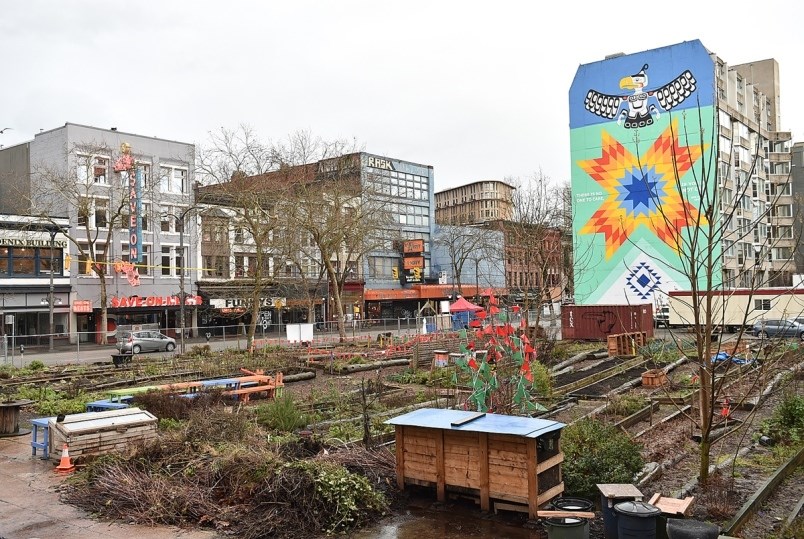In an 8-1 vote Nov. 15, Vancouver council approved a referral motion that will have city staff continue to work towards seeing that as many units as possible rent at welfare or pension rates in a building planned for 58 West Hastings.
The referral motion, tabled by NPA Coun. Melissa De Genova, was in response to a motion that COPE Coun. Jean Swanson put forward for consideration.
Swanson voted against De Genova’s motion.
De Genova's motion directs staff to continue its efforts to “deepen affordability” in the project and provide as many homes at shelter or pension rates as possible, reaffirming the goal of the previous council to provide 100 per cent shelter- and pension-rate housing through consultation with the Vancouver Chinatown Foundation, BC Housing, CMHC and other interest groups; and, if the 100 per cent goal isn’t achievable at 58 West Hastings, staff have been asked to explore alternative options for the City to create 115 units of shelter-rate social housing within the Downtown Eastside.
Council also affirmed its support for providing as many shelter/pension rate units as possible in the Downtown Eastside and city wide.
Staff will report back within one month on what funding is required to achieve the 100 per cent goal for 58 West Hastings and potential sources of funds. Staff will also assess the impact of a 100 per cent shelter/pension rate on the financial viability of the project.
Wording in Swanson’s motion had included language asking staff to outline at least three options for sources of revenue to meet the vision for the site, including city sources. "City sources” was not included in the wording of De Genova’s referral motion, nor was Swanson’s request that staff consult with Our Homes Can’t Wait Coalition and Vancouver Chinatown Foundation and propose how “community controlled housing” could be achieved at the site.
The building
Council approved rezoning at 58 West Hastings back in February of 2018.
The plan is to construct a 10-storey building with seven floors of housing featuring 231 social housing units, as well as retail and health care office uses on the first three floors.
The City of Vancouver owns the property, the Vancouver Chinatown Foundation is to be the leaseholder and Vancouver Coastal Health is to be the healthcare provider. The provincial government has committed $30 million towards the $90-million project while the Vancouver Chinatown Foundation is raising $30 million.
At this point, the target is to see that more than 50 per cent of the social housing units being rented at shelter or pension rates, with the remaining being rented at Housing Income Limits (HILs) rates, which Swanson has said is about $1,200 per month for a bachelor suite.
When it approved rezoning, the previous council included a commitment that city staff and the Vancouver Chinatown Foundation “continue to work to raise additional funds to deepen the affordability of this development with the goal of achieving 100 per cent shelter or pension rents.”
Former Mayor Gregor Robertson also signed a pledge Aug. 2, 2016 to have the 231-unit building rent at pension and welfare rates.
City manager Sadhu Johnston told council at the Nov. 15 meeting that a “considerable financial gap” still exists to reach the goal of 50 per cent of the units being rented at shelter or pension rates.
Decade-long battle
Speaker after speaker on Swanson’s motion echoed her call for 100 per cent of rents to be at shelter and pension rates, and they stressed the importance dignified housing for the city’s most vulnerable.
Speakers represented groups including the Our Homes Can’t Wait Coalition, the Carnegie Community Action Project (CCAP) and Vancouver Tenants Union.
CCAP’s Fiona York said the “social mix experiment” is driving the neediest residents out of the neighbourhood because they can’t afford anything above shelter or pension rates.
Vincent Tao, a member of the Our Homes Can’t Wait Coalition, said it’s a battle community groups have waged for a decade.
“We’ve been fighting for 10 years. I’m tired. We’re all tired… ” he said.
Tao called on council to re-think what it means to build social housing, arguing not all of it needs to be profitable or self-sustaining.
Supporters of Swanson’s motion also argued that funding for the project could easily be raised through the mansion tax COPE proposed during the election campaign.
While rumours have circulated project partners would pull funding if the building is rented at 100 per cent shelter/pension rates, Tao said he’s been told that’s not true.
He also called language suggesting the project could be jeopardized threatening and intimidating.
Before the vote on De Genova's motion, Swanson said she didn’t understand what was wrong with her motion and why wording about “city sources of funding” and “community controlled housing” were excluded.
Aside from generating funding through a mansion tax, Swanson said the city could look at reconciliation funding or find additional funding by reducing the police budget.
Green Party Coun. Adriane Carr said that, as a new council, it’s worth working on the wording of motions so that they can achieve a higher degree of support among councillors.
@naoibh



